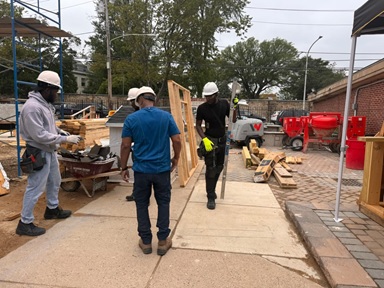Philadelphia has always been a city of builders. But when the time changed and manufacturing slowed and jobs disappeared, the entire blocks began to feel like ghost towns. However, trade programs, once overlooked, started becoming the new lifeline for communities searching for stability and purpose. Families in underserved communities saw opportunities knocking on their doors again.
Those young people who were constantly chasing four-year degrees they couldn’t afford gained a new path altogether. The city, like Philadelphia, couldn’t stay quiet forever. The machine sounds returned, and the revival is being built by hand by people rebuilding through skilled trade programs.
Before this change, which was brought by skilled trade programs, Philadelphia carried a heavy burden. People were moving to cities for better opportunities. Blocks of houses were abandoned, and parents worried their children might leave the town—or worse, stay and struggle without options. It was common that young adults cycled through unstable part-time work, hoping something permanent would appear, but knowing deep down it might not.
The dream of college for many was out of reach. Tuition soared, debt piled high, and even those who earned a degree often found themselves waiting at never-ending interview tables or chasing internships instead of finding stable jobs.
This wasn’t just about jobs; it was about dignity and communities losing their heartbeat.

Then came trade programs—the turning point Philadelphia didn’t know it needed, and much required. These initiatives didn’t begin with speeches or ceremonies. No endless lectures, just workshops, tool belts, and hands-on learning. Trade programs came with shorter timelines for graduation and skills that translate directly into paychecks.
In Philadelphia, trade programs became lifelines. Through Rebuild Philadelphia workforce development programs, residents now gain practical skills—plumbing, carpentry, electrical work—while working on projects that restore the city’s infrastructure. The best part is that residents of underserved communities aren’t merely gaining knowledge; they are creating a better future for themselves and their communities.
This is precisely what skilled trade programs are: Imagine a young person entering one of these programs, uncertain about their future. Within months, that same person stands proudly in front of a restored home, realising they’ve rebuilt more than a house; they’ve rebuilt their community as well as confidence.
When we talk about community revitalization, the immediate image is often a shiny new building. While physical infrastructure is crucial, the impact of the skilled trades goes much deeper, creating a powerful ripple effect:
Ambitious projects like the Rebuild Philadelphia Workforce Development Programs, which is renovating parks, recreation centres, and libraries across the city, rely entirely on the skilled trades. These workers are transforming neglected public spaces into vibrant community hubs, directly improving the quality of life for residents.
For too long, the path to a stable, well-paying career was only seen as a four-year college degree. Skilled trades programs are offering an alternative, debt-free route to high-demand careers. Graduates often start earning competitive wages quickly, with many union apprenticeships even providing pay while trainees learn. This is a game-changer for families seeking economic mobility.
By connecting residents, particularly those from underserved communities, with local training and union apprenticeships, the programs ensure that the wealth generated by the revitalization stays in the community. For example, initiatives like Rebuild focus on recruiting women and people of color, directly addressing historic underrepresentation in the trades.
The success of this initiative lies in targeted, community-focused programs. The City of Philadelphia, through its various partners and initiatives, is creating a direct pipeline from training to employment:

Programs in skilled trade schools like PTTI offer focused training in carpentry, masonry, and more. Participants get real-world, hands-on experience, often on public worksites, preparing them not just with technical skills but also with an understanding of job-site culture and safety.
Local trade schools and community colleges are working directly with unions and employers to tailor their curricula to the city’s immediate workforce needs. This collaboration ensures that graduates have the precise skills that are in demand, leading to high job placement rates, often with pathways directly into union apprenticeships.
Many of these programs are intentionally structured to support residents facing barriers to employment, including those who are justice-impacted or who lack a traditional college background. The training provides not just a skill, but a renewed sense of dignity, purpose, and self-belief, transforming individual lives and strengthening the social fabric of the community.
The skilled trades are not just a temporary fix; they are a long-term investment in Philadelphia’s future. These jobs are stable, essential, and less susceptible to outsourcing or full automation. As the demand for everything from maintaining aging infrastructure to building modern, sustainable homes continues to grow, the importance of electricians, welders, and technicians will only increase.
Philadelphia’s dedication to connecting capital investment with workforce development proves a powerful point: community rebuilding must be both structural and human. By empowering its residents with the skills to rebuild their own neighborhoods, the city is fostering genuine, resilient revival from the ground up.
Are you interested in a new career path or know someone who is? Explore the local trade programs and union apprenticeships in your area; the future of your community might just be waiting for a skilled hand.
Read more: